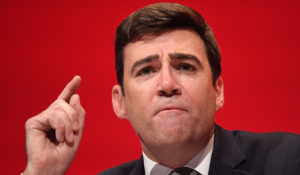Late on Tuesday night, I was sitting on a bus back to Manchester city centre from Salford Quays, where I had just watched La Traviata at The Lowry theatre. I was the sole passenger on the top deck, except for one young guy in a hoodie sitting a few seats in front of me. He turned out to be an opera singer, studying at the prestigious Royal Northern College of Music. He leaned over to chat because he had heard me interviewing people after the show about the prospect of the English National Opera moving north — and wanted to give me his own views.
It probably wouldn’t work, he said. The audience for opera is in London. I told him I disagreed. We had both just witnessed first-hand a large and enthusiastic audience for opera in Greater Manchester, after all. Not only could the move work, but it would also be a great thing for the UK to have a leading company operating out of one of its most central and fast-growing cities. Allied with Opera North, whose production we had just watched and who tour the entire region from Leeds, it would make this part of the country a global opera powerhouse.
By the time I got off the bus, my companion was telling me how a Manchester ENO would allow talented musicians like him to stay in the North after graduating, rather than feeling forced to move to London, or overseas. “I’m just surprised that you are the only person making the argument,” he said.
The reason nobody has heard the case for a Manchester ENO is that the media coverage of this important arts story has been laughably, atrociously London-centric. “English National Opera fights ‘absurd’ plan to relocate to Manchester,” ran the headline of a story on the BBC. It quoted the ENO’s chief executive Stuart Murphy calling the move “insane” but didn’t counter his analysis with a single northern voice.
Several newspaper reports accepted, apparently without fact-checking, Murphy’s comparison of London’s “9 million people” with “Manchester’s half a million”. It seems neither the reporters nor the editors on those papers could see the mistake the ENO chief was making, although it seems that Northern readers pointed out the problem to the Guardian. The paper has removed Murphy’s misleading quote and replaced it with “a more accurate comparison between the greater metropolitan populations of London and Manchester”. (The population of Greater Manchester is almost 3 million.)
The ignorance didn’t end there. The Observer’s classical music critic Fiona Maddocks said the ENO plans “certainly make no sense” because Manchester is already “well served” by Opera North — a company that is based in Leeds and usually only comes to Salford for one week every year. Maddocks, perhaps, was straying a little outside her area of expertise: the Observer’s classical desk, as one of my readers emailed me this week, “pretty much exclusively writes about things staged in London”. The reader went on to point out that whereas Opera North’s headquarters, at Leeds’ Howard Assembly Room, are an hour and a half’s drive from central Manchester, “the ENO is about six minutes’ walk away from the Royal Opera House, so who is best served?”
It’s understandable that the art world is shaken by the idea of the ENO moving. It is a loss for most of the people making and writing about opera, because they live in London. And it makes sense for an industry to fight against imminent job losses, and to complain that the decision has been made without proper planning or pitch-rolling in the North. What is unforgivable is that the media acted as a supportive chorus for London-based vested interests. I’ve yet to see a story in the national press that doesn’t frame the ENO funding decision as a disastrous folly or a betrayal of the arts. (Melvyn Bragg, also in the Observer, described the Arts Council decision as “stealing arts cash from London”, as though the capital is entitled to as much as it likes from the national coffers.) And it’s not just me who clocks this London-centricity in British journalism — and hates it.
“It’s all been reported as ‘London is losing this thing’,” says a journalist from a national newspaper who I spoke to this week (who asked me not to use their name). “So they fucking should,” they went on. “Why should that be in London? If that’s taxpayer funded, if it’s the ‘National Opera’, why shouldn’t it be in Manchester? Why should Manchester residents have to travel to London?”
That journalist is one of the very small cohort of national newspaper correspondents not based in London, covering a patch that can only be described as “the rest of the country”. Of course, that’s impossible. “You’re not covering the country — you’re covering what Londoners want to read about the rest of the country,” this person told me, pointing out that the tabloids are better staffed out here in the wilds than the broadsheets are.
As the coverage of the ENO story makes clear, we don’t have a national press. We have lots of London newspapers whose claim to be national ranges from wafer thin — the Guardian has a staff of four in Manchester — to arguably fraudulent. Most of the national newspapers in England have fewer than five staff correspondents outside London. Some “nationals” don’t appear to have a single one.
“They call themselves national because they are sold in a shop in Cumbria, but they’re not national,” one northern editor told me this week. The papers that claim to speak for the whole country are, in the view of this seasoned reporter, clever variations on the London Evening Standard.
That’s the paper where I spent the first five years of my career, by the way. I’m a southerner who values the capital’s diverse and noisy journalistic scene. What’s annoying isn’t that the London media exists and is strong and argues eloquently and passionately for the protection and extension of London’s privileges — it’s that it does those things while pretending to be the national media. It makes total sense that newspapers whose editors and reporters almost all live in a single city would reflect that city’s interests and blind spots. But it doesn’t make for very satisfying coverage for those of us living elsewhere.
When I asked my Twitter followers for their favourite examples of London-centric media coverage following the ENO debacle, the answers came thick and fast. One theme was the assumption that everyone lives in London. There was a piece in the Sunday Times property section about moving to York which listed one of the downsides as: “It’s so far away.” There was a column in the New Statesman in which a well-meaning political journalist wrote: “In my view, every journalist should make a New Year’s resolution to get out of London more.”
Lots of replies to my tweet mentioned weather coverage, from the trivial — snow coverage tends to kick in when it’s snowing in the South East — to the rather sad. “When the North East had awful weather early last year, some areas of Northumberland had to wait weeks for all utilities to be restored,” one person wrote, noting that the story and its impact on millions of people was sparsely covered in the national news.
What shocks me, as a relative newcomer to the North, is how bad the public transport is — and how little I’d been prepared for it by reading the national (sorry, London) newspapers. There is no way that the current state of the North’s railways — appalling; unbelievable — would be allowed to continue if it were happening in the South East. It’s often journalists personally experiencing things that lead them to prioritise a story, and very few of them are experiencing the 23 cancelled services every day from Manchester to Leeds.
Imagine if this kind of disruption took place anywhere near London — actually, we don’t have to imagine: remember the Southern Rail strikes, reported as if it were a national emergency — the editors who frame our national debate would be firing off angry emails to their columnists and news editors from freezing platforms. The stink would be so great that ministers would be forced to drop everything and fix it within days. And yet up here, month after month, despite the attempts of local politicians to raise the issue, the crisis drags on, paralysing large swathes of the country.
After Brexit there seemed to be a moment of self-reflection in the British press, from certain columnists at least, regarding the abject failure to understand the brewing feelings and major demographic shifts that drove a seismic political event that few in London saw coming. But the reason for that short-sightedness was structural, not something a few fleeting trips to the high streets (never the more-important suburbs) of Northern towns is going to fix.
The structural problem is that if you have 95% of your workforce living in one world, you are going to miss a lot of important stories in all the other worlds that make up this country. “You have got an insane number of people sitting together in the same room with the same lives and talking about the same experiences,” as one Northern correspondent put it to me. “It’s utterly bizarre.”
I’m writing this article from The Mill’s office on Cross Street, over the road from where The Manchester Guardian used to be based. That building has long gone and is now a Boots, with a small plaque on the outside wall marking its former use. Within walking distance there used to be massive northern newspaper offices for the Daily Express, the Daily Telegraph and the Daily Mail — an ecosystem, referred to as “the other Fleet Street”, that lasted for half of the twentieth century.
Technological change put an end to those operations and drove a radical centralisation of our media in London. But the technology we have now means that any news organisation can quite easily have dozens of reporters spread across every region. Suddenly, we would see a different kind of journalism creeping into the papers — one that tells us less about meaningless jockeying between random 20-something political advisors in Westminster, and more about how government policy is impacting people’s lives; how people hundreds of miles from the centre of power are experiencing the British state. The benefits of de-Londonising the media will flow far beyond journalism into policymaking and the nation’s understanding of itself. The newspapers could decide tomorrow that they want to represent this country properly again. And if they want us to call them nationals, they should.
Disclaimer
Some of the posts we share are controversial and we do not necessarily agree with them in the whole extend. Sometimes we agree with the content or part of it but we do not agree with the narration or language. Nevertheless we find them somehow interesting, valuable and/or informative or we share them, because we strongly believe in freedom of speech, free press and journalism. We strongly encourage you to have a critical approach to all the content, do your own research and analysis to build your own opinion.
We would be glad to have your feedback.
Source: UnHerd Read the original article here: https://unherd.com/





